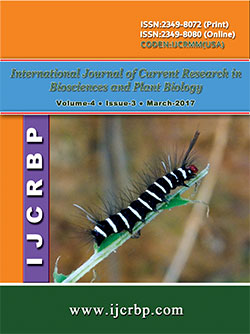 |
Online ISSN : 2349-8080 Issues : 12 per year Publisher : Excellent Publishers Email : editorinchiefijcrbp@gmail.com |
2Department of Life Sciences, Kristu Jayanti College (Autonomous), K. Narayanapura, Kothanur P.O., Bangalore-560 077, India
Selection of salinity tolerant genotypes of rice based on the phenotypic variation is not consistent and thereby, will hinder the advancement in breeding. However, the recent introduction of the use of molecular markers, microsatellites or simple sequence repeats (SSRs) to detect the salt tolerant rice genotypes is reliable. The objective of the present study was to screen the four indigenous rice genotypes collected at Coastal Saline Research Centre, Ramanathapuram, Tamil Nadu, India, under saline and non-saline conditions using the microsatellite markers for the identification of salt tolerant genotypes at the seedling and reproductive stages. Two selected SSR markers were used to determine salinity tolerance in rice genotypes. SSR based marker identified three genotypes as tolerant at least tolerant to one of the two SOS markers but one variety was susceptible for both the markers. The detected salt tolerant genotypes can be a probable germplasm resource for prospective breeding program.
